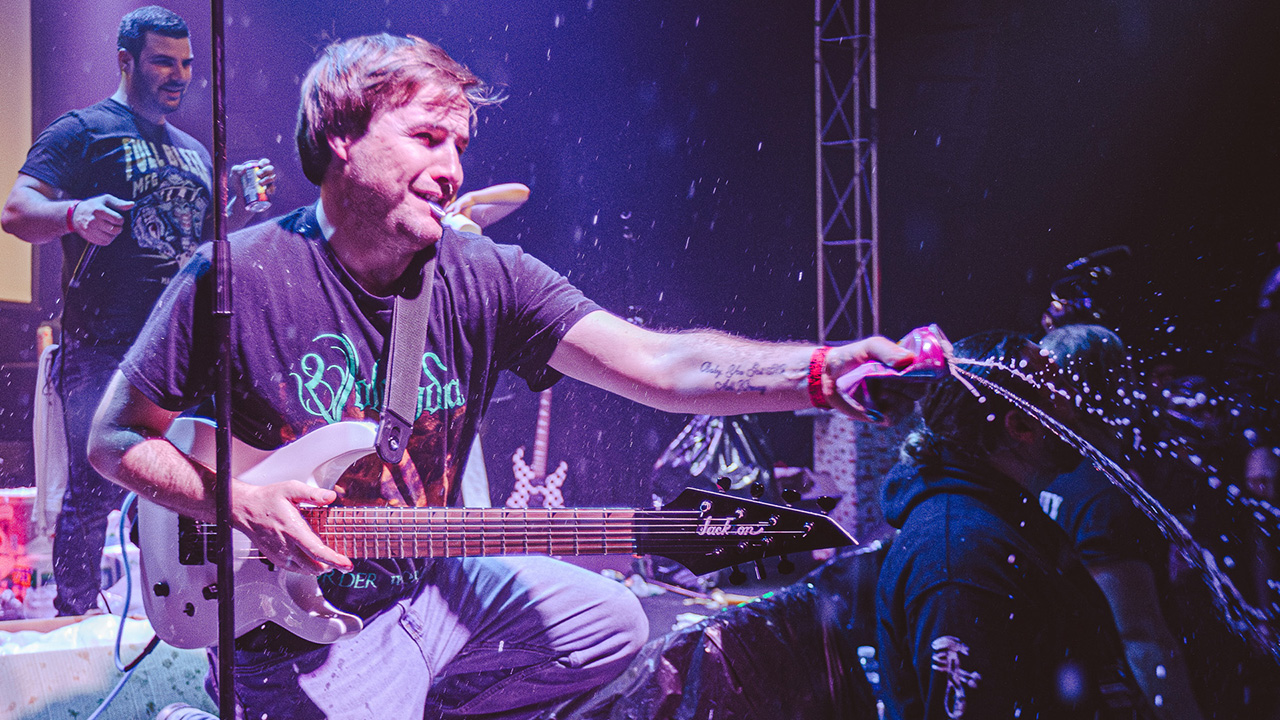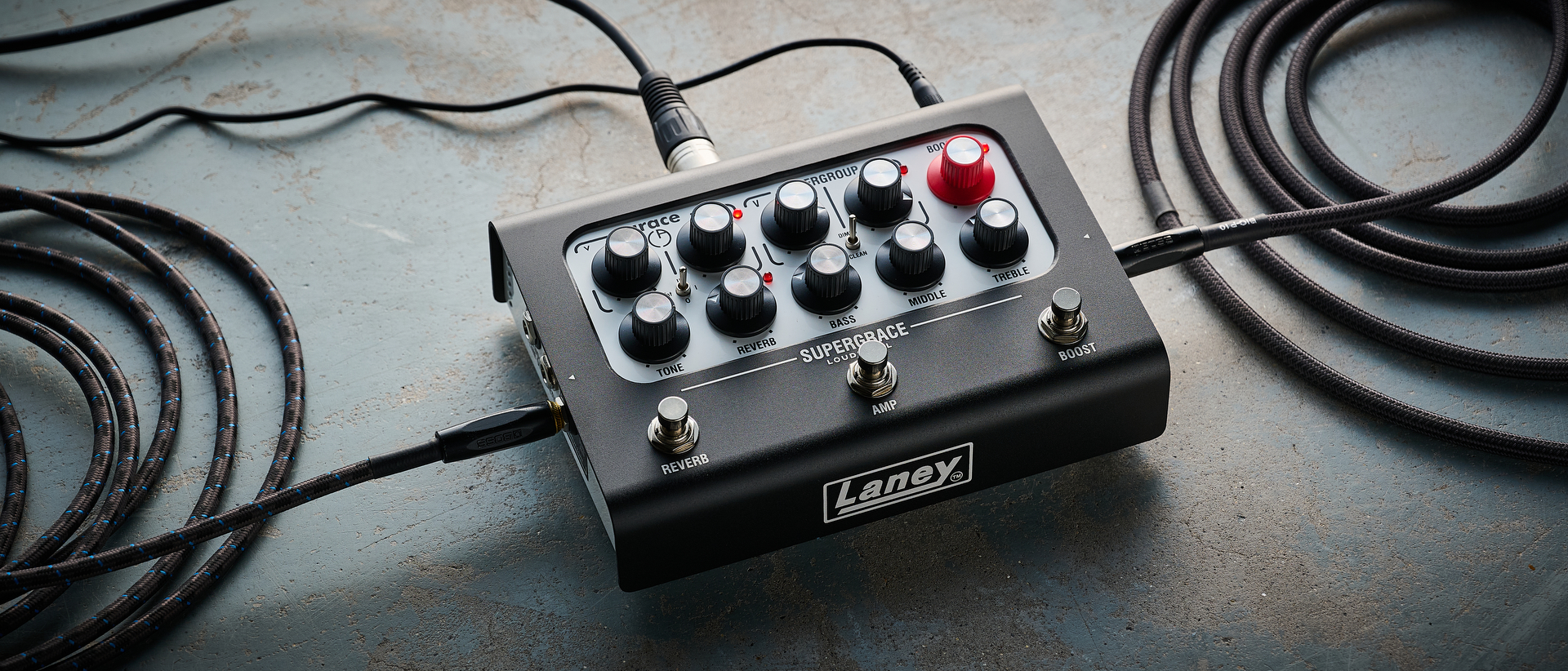“Karl Sanders taught me there are way more notes you can play during a solo than notes you can’t”: Meet Belushi Speed Ball, the ‘pizza thrash’ band chasing greasy guitar tones and making a pineapple-friendly racket on rare ‘90s Jacksons
Inspired by death metal greats, Belushi Speed Ball’s fourth album is available as an actual pizza, and features two new guitarists to slam home more punchlines – but beneath the silliness there’s escapism in their mad maelstrom

All the latest guitar news, interviews, lessons, reviews, deals and more, direct to your inbox!
You are now subscribed
Your newsletter sign-up was successful
Don’t let Belushi Speed Ball’s ‘pizza thrash’ shtick trick you: They care deeply about the art of heavy metal guitars. They’re just not bogged down by the seriousness of the genre.
“Being onstage is so much better when everyone is having fun,” says guitarist Jamison Land, who, until 2022, had been the bassist in GWAR. “When everyone takes themselves too seriously, it kills the spontaneity and egos get carried away.”
Co-guitarist Derrek Tipton adds: “Our shows can be absolute pandemonium. Things happen that no-one can predict, like people throwing furniture into the pit. I don’t think the venue was too happy about that.”
Back with fourth album Stellkira, Belushi Speedball deliver wonderful caricatures of themselves once again. Having previously released music via Game Boy cartridges, they’ve now become the first band to release physical music on an actual pizza – which comes encased in resin and houses a mini speaker.
“People will call us ‘pizza thrash’ in a disparaging way like, ‘How dare they have fun?’” says Tipton. “I used to be a crime reporter and it was super-depressing. With Belushi, I can retreat into this world of chaos and stupidity. It’s my escapism, so I imagine for other people it is, too.”
But it isn’t all fun and games. With guitar solos an integral part of their energy, Tipton took lessons from Nile’s Karl Sanders to sharpen his shredtastic chops.
“My guitar theory wasn’t that great, but those lessons opened the doors a lot for me,” he says. “I realized there are way more notes you can play than notes you can’t in any given key.” Pairing his new knowledge with Jackson’s super model-thin necks, he feels unstoppable.
All the latest guitar news, interviews, lessons, reviews, deals and more, direct to your inbox!
“My first guitar was an Ibanez G Series, but then I played a friend’s Jackson and it felt like I could play a million miles an hour. They make me feel like I’m better at guitar than I actually am!”
Meanwhile, Land’s approach to killer solos is a little more primal. “There are times when I’ll go in the studio and write something on the spot. It’s all about the energy. I’m not super-technical, so I use a lot of flashy legato to make me seem better. But melody is the most important thing… and a big reverb so it sounds like you’re playing in a cave.”
Land grew up studying Dave Mustaine’s “precision and rhythms” and learned to hate guitarists who “wear those stupid folded cowboy hats like Bret Michaels.” Guitars are in his DNA: his father managed the vintage gear store, Guitar Emporium, in Louisville, so a childish wonder for the instrument still flows through him.
“My most prized guitar is my ‘90s Japanese Jackson Rhoads Pro,” he says. “I used to see ads for it in magazines and would drool over it. I found one on eBay in the early ‘00s and it’s been my go-to ever since. It plays like a dream.
“I have another ‘90s Japanese Rhoads that was sold to me as a Rhoads Psycho. It has a very unique paint job – yellow with red sponge paint. I got it for $500. Doug Aldrich had an artist series of Dinkys that were called Psychos and had the same paint scheme, but I’ve never seen it on a Rhoads. I may have the only one!”

Land’s collection also includes an Indonesian Jackson Kelly with a cracked mirror finish, and a pearlescent pink Jackson X Series Soloist SL1X that he’s modded with a Sustainiac pickup. “It screams for days!” he reports. “I put a lot of high-pitched dive bombs on this new record with that thing.”
He puts them through a Kemper amp modeler – and he’s convinced its Marshall Mode Four MF350 capture is better than the real thing. “You can dial it in so much better; it has so many more tonal possibilities,” he explains. “If I were to compare my rhythm tone to a pizza topping, I’d compare it to a crispy, greasy pepperoni!”
Tipton, meanwhile, uses a Diesel-style amp on his Axe-Fx with the brightness “cranked all the way up”. He explains he’s tonally inspired by Killswitch Engage and Shadows Fall.

But enough of the nerdy nonsense. Guitar World is here to ask the hard-hitting question: if the band were a pizza, what toppings would it have? “It’d have everything you need,” says Tipton.
“A tomato base and plenty of cheese, because we’re cheesy, too. Then we’d have some pepperoni to represent our thrash and punk riffs, and throw some pineapple on there to add some chaos!”
“Pineapple on pizza is delicious,” Land confirms. “The haters can go cry on their wood-fired margarita.”
- Stellkira is out now.
A freelance writer with a penchant for music that gets weird, Phil is a regular contributor to Prog, Guitar World, and Total Guitar magazines and is especially keen on shining a light on unknown artists. Outside of the journalism realm, you can find him writing angular riffs in progressive metal band, Prognosis, in which he slings an 8-string Strandberg Boden Original, churning that low string through a variety of tunings. He's also a published author and is currently penning his debut novel which chucks fantasy, mythology and humanity into a great big melting pot.


